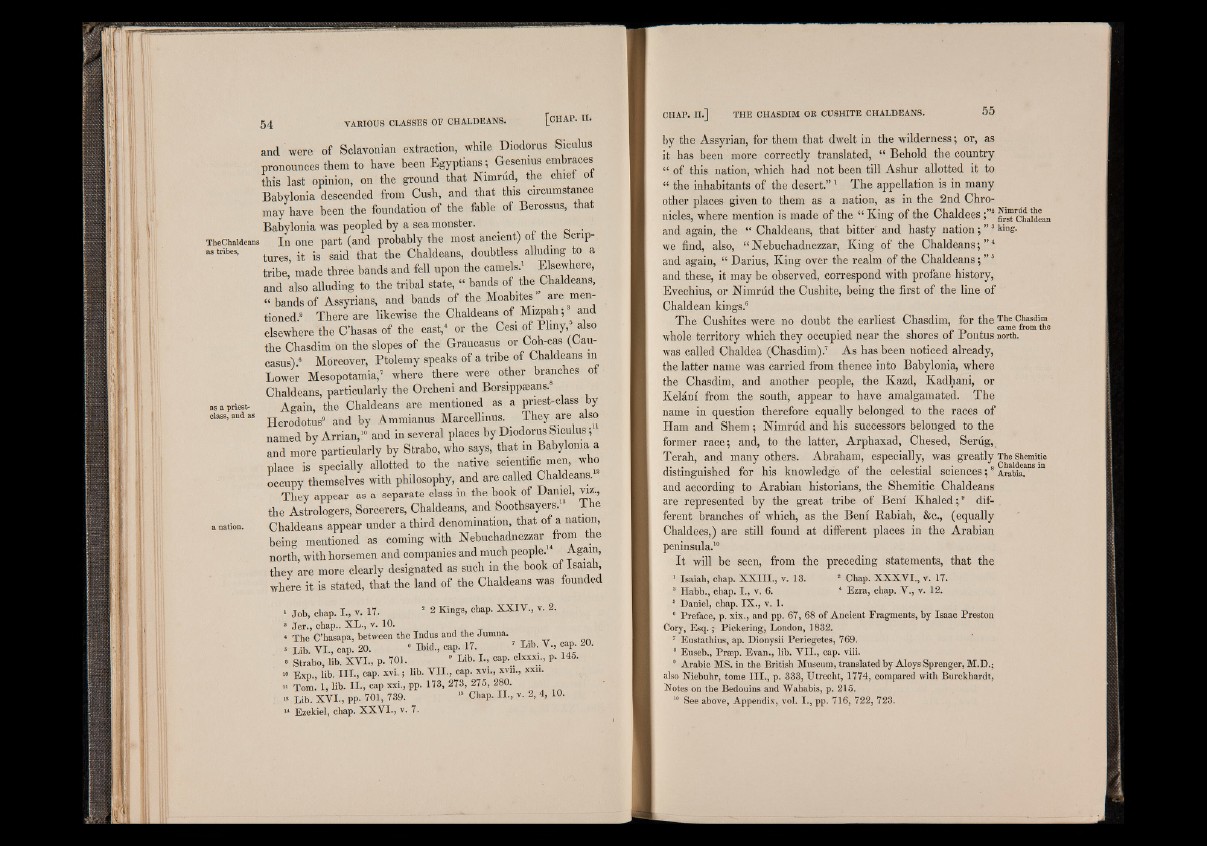
and were of Sclavonian extraction, while Diodorus Siculus
pronounces them to have been Egyptians ; Gesenius embraces
this last opinion, on the ground that Nimrud, the chiet ot
Babylonia descended from Cush, and that this circumstance
may have been the foundation of the fable of Berossus, that
Babylonia was peopled by a sea monster. _
rheChaideans In one part (and probably the most ancient) of the bcnp-
tures it is said that the Chaldeans, doubtless alluding to a
tribe’ made three bands and fell upon the camels.1 Elsewhere,
and also alluding to the tribal state, | bands of the Chaldeans,
“ bands of Assyrians, and bands of the Moabites ” are mentioned.
2 There are likewise the Chaldeans of Mizpah ; and
elsewhere the C’hasas of the east,4 or the Cesi of Pliny,5 also
the Chasdim on thè slopes of the Graucasus or Coh-cas (Caucasus).
6 Moreover, Ptolemy speaks of a tribe of Chaldeans in
Lower Mesopotamia,"' where there were other branches of
Chaldeans, particularly the Orcheni and Borsippaeans.8
as a priest- Again, the Chaldeans are mentioned as a priest-class by
dass, and as Herodotus9 and by Ammianus Marcellinus. _ They are also
named by Arrian,10 and in several places by Diodorus Siculus ;n
and more particularly by Strabo, who says, that in Babylonia a
place is specially allotted to the native scientific men, who
occupy themselves with philosophy, and are called Chaldeans.
They appear as a separate class in the book of Daniel, viz.,
the Astrologers, Sorcerers, Chaldeans, and Soothsayers.13 The
a nation. Chaldeans appear under a third denomination, that of a nation,
being mentioned as coming with Nebuchadnezzar ^from the
north, with horsemen and companies and much people.1 Again,
they are more clearly designated as such in the book of Isaiah,
where it is stated, that the land of the Chaldeans was founded
1 Job, chap. I., v. 17. 2 2 Kings, chap. X X IV ., v. 2.
2 J e r., chap.. XL ., v. 10.
* The C’hasapa, between the Indus and the Jumna.
5 Lib. V I-, cap. 20. 6 Ibid., cap. 17. 7 Lib. V., cap. 20.
; » Strabo, lib. X V I., p. 701. 8 Lib. I ., cap. clxxxi., p. 145.
10 Exp., lib. I I I - , cap. xvi. ; lib. V I I ., cap. xvi., xvu., xxu.
11 Tom. 1, lib. I I-, cap xxi., pp. 173, 273, 275, 280.
« Lib. X V I., pp. 701, 739. 18 Chap. I I ., v. 2, 4, 10.
by the Assyrian, for them that dwelt in the wilderness; or, as
it has been more correctly translated, “ Behold the country
“ of this nation, which had not been till Ashur allotted it to
“ the inhabitants of the desert.” 1 The appellation is in many
other places given to them as a nation, as in the 2nd Chronicles,
where mention is made of the “ King of the Chaldees ;”2 S c h a u L a
and again, the “ Chaldeans, that bitter' and hasty nation; ” 3
we find, also, “ Nebuchadnezzar, King of the Chaldeans; ” 4
and again, “ Darius, King over the realm of the Chaldeans; ” 5
and these, it may be observed, correspond with profane history,
Evechius, or Nimrud the Cushite, being the first of the line of
Chaldean kings.6
The Cushites were no doubt the earliest Chasdim, for the The Chasdim came from the
whole territory which they occupied near the shores of rontus north,
was called Chaldea (Chasdim).7 As has been noticed already,
the latter name was carried from thence into Babylonia, where
1 the Chasdim, and another people, the Kazd, Kadhani, or
Kelani from the south, appear to have amalgamated. The
name in question therefore equally belonged to the races of
Ham and Shem; Nimrud and his successors belonged to the
; and, to the latter, Arphaxad, Chesed, Seriig,
many others. Abraham, especially, was greatly The shemitie
former race
Terah, and
distinguished for his knowledge of the celestial sciences; 8 Arabia”8m
and according to Arabian historians, the Shemitie Chaldeans
are represented by the great tribe of Beni Khaled ; 9 dif- ,
ferent branches of which, as the Beni Rabiah, &c., (equally
Chaldees,) are still found at different places in the Arabian
peninsula.10
It will be seen, from the preceding statements, that the
1 Isaiah, chap. X X I I I ., v. 13. ! Chap. X X X V I., v. 17.
8 Habb., chap. I ., v. 6. 4 Ezra, chap. V., v. 12.
5 Daniel, chap. IX ., v. 1.
' Preface, p. xix., and pp. 67, 68 of Ancient Fragments, by Isaac Preston
Cory, E sq .; Pickering, London, 1832.
7 Eustathius, ap. Dionysii Periegetes, 769.
8 Euseb., Prsep. Evan., lib. V II., cap. viii.
8 Arabic MS. in the British Museum, translated by Aloys Sprenger, M .D.;
also Niebuhr, tome I I I ., p. 333, Utrecht, 1774, compared with Burckhardt,
Notes on the Bedouins and Wahabis, p. 215.
10 See above, Appendix, vol. I ., pp. 716, 722, 723.